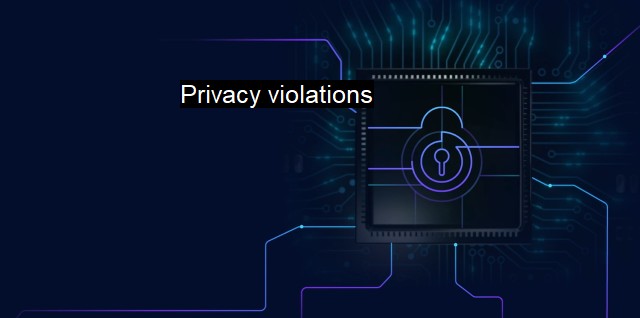The Dark Side Of AI Therapy: Privacy Violations And State Control

Table of Contents
Data Security and Privacy Risks in AI Therapy
The allure of readily available, AI-driven mental health support is undeniable. However, this convenience comes at a cost. The sensitive nature of the data shared during AI therapy sessions—detailed personal experiences, emotional vulnerabilities, and potentially even diagnoses—makes it a prime target for malicious actors.
Data breaches and unauthorized access
AI therapy platforms, like any technology reliant on data storage and transfer, are vulnerable to data breaches and unauthorized access.
- Examples: Recent breaches in healthcare and other tech sectors demonstrate the ease with which sensitive information can be compromised. The sheer volume of personal data held by these platforms presents a large attack surface.
- Lack of Security: Many AI therapy apps lack robust security measures, leaving user data exposed to hacking attempts and other security vulnerabilities.
- Identity Theft Risks: Exposure of mental health data can lead to identity theft, financial fraud, and other serious consequences, far exceeding the risks associated with other data breaches. The personal details revealed can be incredibly valuable to criminals.
The sensitive nature of mental health data cannot be overstated. Exposure of this information can have devastating consequences for individuals, including reputational damage, social stigma, and emotional distress.
Data ownership and usage rights
The terms and conditions governing data ownership and usage in AI therapy apps often lack clarity and transparency.
- Unclear Policies: Many apps have vague or exploitative data usage policies, leaving users unsure of how their data is used, stored, and potentially shared.
- Third-Party Sharing: The potential for data sharing with third-party companies, including advertisers or research institutions, raises significant concerns about user privacy and autonomy. This often happens without explicit informed consent.
Users must understand that signing up for AI therapy often means relinquishing control over their most personal and sensitive information. This lack of transparency undermines user autonomy and poses considerable ethical dilemmas.
Encryption and anonymization limitations
While encryption and anonymization techniques aim to protect user data, they are not foolproof.
- Breaches despite Encryption: Even with encryption, sophisticated cyberattacks can still successfully breach secure systems and access sensitive data.
- Incomplete Anonymization: Fully anonymizing mental health data is exceptionally difficult, given its rich contextual information. Clever adversaries can often re-identify individuals even with anonymization techniques.
Relying solely on technical safeguards to protect sensitive mental health data is a risky strategy. A multifaceted approach, incorporating robust legal and ethical frameworks, is crucial.
State Control and Surveillance through AI Therapy
The potential for state control and surveillance through AI therapy presents a chilling prospect. The sheer volume of personal and sensitive data collected could be easily exploited for various purposes.
Potential for government monitoring
AI therapy data could become a valuable resource for government agencies seeking to monitor citizens.
- Government Access Precedents: Governments worldwide have demonstrated a willingness to access private data for surveillance purposes, often under the guise of national security or public health.
- Profiling and Discrimination: Therapy data could be used to create detailed psychological profiles of individuals, potentially leading to discriminatory practices or unwarranted targeting.
This potential for government monitoring fundamentally erodes patient confidentiality and discourages open and honest communication during therapy, hindering the very process it aims to support.
Algorithmic bias and discrimination
AI algorithms are not immune to the biases present in the data they are trained on. This can lead to discriminatory outcomes in mental healthcare.
- Algorithmic Bias Examples: Algorithmic bias has been documented in various sectors, from loan applications to criminal justice. Similar biases can easily infiltrate AI therapy algorithms.
- Perpetuating Inequalities: Biased algorithms could perpetuate existing societal inequalities, leading to disparities in access to mental health services and potentially exacerbating mental health issues for marginalized groups.
Fairness, accountability, and transparency are paramount in the development and implementation of AI algorithms used in mental healthcare.
Lack of regulatory oversight and ethical guidelines
The current regulatory landscape surrounding AI in mental healthcare is largely underdeveloped.
- Need for Data Protection Laws: Stricter data protection laws are urgently needed to safeguard user privacy and prevent the misuse of sensitive data.
- Ethical Review Boards: Independent ethical review boards should oversee the development and deployment of AI therapy apps, ensuring compliance with ethical guidelines and user rights.
The absence of comprehensive regulations and ethical guidelines creates a significant gap, leaving users vulnerable and hindering responsible innovation.
Conclusion
The dark side of AI therapy encompasses significant concerns about privacy violations and state control. While AI offers potential benefits for mental healthcare, the risks associated with data security, algorithmic bias, and the potential for government surveillance must be addressed proactively. We must acknowledge the potential for these technologies to be used to exploit vulnerabilities and reinforce existing societal inequalities.
Protecting your privacy and mental wellbeing requires vigilance. Demand better regulation and transparency in AI therapy. Advocate for stronger data protection laws, independent ethical oversight, and greater user control over personal data. Only through informed consumerism and active participation in shaping the future of AI in mental healthcare can we ensure this technology is used responsibly and ethically.

Featured Posts
-
 The Washington Examiners Coverage Of Joe Bidens Denials
May 15, 2025
The Washington Examiners Coverage Of Joe Bidens Denials
May 15, 2025 -
 Andor Season 2 Trailer Breakdown From Death Star To Yavin 4
May 15, 2025
Andor Season 2 Trailer Breakdown From Death Star To Yavin 4
May 15, 2025 -
 Will The Dodgers Master Plan Fail Due To Padres Interference
May 15, 2025
Will The Dodgers Master Plan Fail Due To Padres Interference
May 15, 2025 -
 The Ultimate Guide To Creatine Benefits Risks And Dosage
May 15, 2025
The Ultimate Guide To Creatine Benefits Risks And Dosage
May 15, 2025 -
 Lafc Victory Over San Jose Earthquakes Impact Of Daniels Injury
May 15, 2025
Lafc Victory Over San Jose Earthquakes Impact Of Daniels Injury
May 15, 2025
